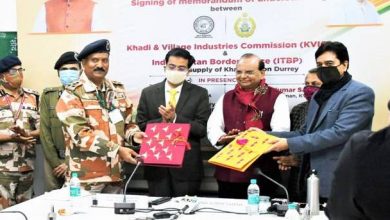Vice President calls for making skilling initiatives mandatory from school level
New Delhi: The Vice President of India, Shri M Venkaiah Naidu calledfor mandatory inclusion of skilling initiatives at school level saying “schooling and skilling must go together”.
Addressing the gathering after inaugurating Residential Skilling Center of Deshpande Foundation in Hubbali today, he said that not enough attention was paid in the past to skilling in the education system and called for revisiting the education policy to make it compulsory for imparting skills to school students.
There was a need to introduce vocational education in the curriculum to create an ecosystem that produces skilled manpower, he observed.
Shri Naidu said that the New Education Policy must address both skilling and scalingand added that it was the duty of the Government of India and all the States to ensure that school children were imparted skills in all spheres.
The Vice President also wanted augmenting ofthe skills relevant to the needs of rural India and agriculture as part of the initiatives to make agriculture viable and profitable. He also stressed the need for promoting rain water harvesting in a big way.
Observing that agriculture needed a multi-pronged approach from providing infrastructure to ensuring access to market for agricultural commodities, the Vice President asserted that freebies and loan waivers were not going solve the problems faced by farmers and permanent solutions were needed.
Expressing his confidence that the Indian economy would bounce back if the reforms were continued at the same pace, Shri Naidu appealed to the industry and the corporate sector to join hands with the Universities and academic institutions for strengthening R & D and preparing youngsters to adapt to 21st century requirements.
Calling for creating an ecosystem for innovation and entrepreneurship to thrive, Shri Naidu also urged the youth to make good use of initiatives like Skill India and acquire knowledge and skills relating to new technologies, including artificial intelligence and machine learning.
Describing India as a very diverse country in terms of geography, language, religion and income, the Vice President stressed the need forinclusive and equitable growth. “It was imperative that all sections of the society are benefited by the skill development programmes”, he added.
Shri Naidu said that with 65% of our population below 35 years of age, India was a young nation and has the unique opportunity to serve as a global human resource hub. This vast human resource pool would drive the expansion of the knowledge-based economy, he added.
Stressing the need to create pull factors to attract workers for skill training, the Vice President said that presently the employer does not distinguish whether an employee has picked up skills on the job or has acquired them through formal courses. He urged the government and industry to change this by giving preference to workers with formal skill certification during the recruitment process.
To further incentivise skill training, Shri Naidu suggested to compulsorily include a minimum percentage of certified skilled workers in every manpower intensive project tendered by the government.
The Vice President also wanted the skill development institutions and their faculty to sensitize trainees on the importance of protecting environment. “Our path for development should be environmentally sustainable”, he said.
Programmes like Swachh Bharat, Fit India, Skill India and Digital India should become people’s movements to transform the nation and accelerate the progress. He urged the people to voluntarily participate in such programmes.
The Vice President appreciated institutions such as the Deshpande Foundation for imparting skills for the rural youth and appealed to private sector and philanthropists to accord priority to skill training.
He also advised the youth to play an active and constructive role in nation-building and adopt a positive attitude. Observing that there was no place for violence in a democracy, the Vice President said that the ballot was more powerful thana bullet.
Shri Pralhad Joshi, Union Minister of Parliamentary Affairs,Coal and Mines, Shri Jagadish Shettar, Minister of Large & Medium ScaleIndustries and Public Enterprises, Govt. of Karnataka, Shri Basavaraj Bommai, Minister for Home Affairs andCooperation, Govt. of Karnataka, Dr. Gururaj Desh Deshpande, Founder, Deshpande Foundation and Dr. Jaishree Deshpande, Co-founder, Deshpande Foundation were among the dignitaries who graced the occasion.
The following is the full text of the speech:
I am pleased to be amidst you for the inauguration of the residential skilling center of Deshpande Foundation.
I am very happy to see so many young faces in front of me. I can feel your energy and your dynamism. You are the future of this great nation.
With 65% of our population below 35 years of age, India is a young and aspirational nation. It is estimated that about 250 million young people will join India’s workforce over the next decade.
Today, we have a unique opportunity. There is a huge demographic dividend waiting to be realized. More working people means more savings which, in turn, means more money for investments. This vast human resource pool will drive the expansion of knowledge-based economy.
We cannot afford to lose this opportunity or miss the bus.
However, the challenge is to train and upgrade youth’s skill levels to enable them to effectively respond to rapid changes of the 21st century.
According to a report, less than 5% of our total workforce has undergone formal skill training compared to 68% in the UK, 75% in Germany, 52% in the USA, 80% in Japan and 96% in South Korea.
And it is a well-known fact that Skills and knowledge are driving forces of economic growth and social development for any country.
With young men and women entering the labour market and looking for jobs, the industries need appropriately skilled manpower.
To address this requirement, the Government of India under the leadership of the Prime Minister Shri Narendra Modi created a separate Ministry for skill development in India. In the year 2015, the National Policy for Skill Development and Entrepreneurship was formulated in the spirit of ‘SabkaSath –Sabka Vikas’. The same year, the National Skill Development Mission was also launched.
Under the Mission, 20 Central Ministries/Departments including Ministry of Skill Development and Entrepreneurship are involved in the implementation of more than 40 schemes/programmes on Skill Development.
I am happy to note than One Crore youth are being imparted skills training annually under various programs of the National Skill Development Mission.
Around 87 lakh youth have been trained under the flagship Pradhan Mantri Kaushal Vikas Yojana since its inception.
I am told that Recognition of Prior Learning (RPL) has been introduced to give formal recognition to prior informal skills and learning experiences of an individual.
Till date, more than 26 lakh people have been oriented under the RPL program of Pradhan Mantri Kaushal Vikas Yojana (PMKVY).
Today, we have more than 681 Pradhan Mantri Kaushal Kendras (PMKKs) across the country, which are state-of-art centers of skilling in courses relevant to the local industries.
As we aspire to tap the job prospects in global market for our skilled manpower, our training modules should be comparable with global benchmarks. With the massive expansion of training facilities, there is also a need to ensure quality of training, availability of infrastructure, qualified faculty and state of the art curriculum.
I feel that the hand-holding should continue after the training. It is essential that placement should be facilitated or the trainees should be guided to set up their own enterprises.
However this ambitious target of training millions of youth is not without its own challenges.
A major difficulty in the task of skilling is the heterogeneity of the Indian labour market. It is known that 93% of the total labour force is in the unorganised sector.
This makes it a challenging task to design a model which benefits all the key players of the ecosystem– employer, training providers and trainee.
Also, India is a diverse country in terms of geography, language, religion and income. For inclusive and equitable growth, it is imperative that all sections of the society are benefited by the skill development programmes.
Skill development initiatives also need to focus on augmenting skills that will be relevant to the local needs. This would help stem the migration of population towards the urban and industrial centres.
Introducing vocational education as part of the curriculum is essential to create an ecosystem that produces skilled manpower. Further, the government and industry must create pull factors to attract workers for skill training. Presently the employer does not distinguish whether an employee has picked up skills on the job or he has acquired them through formal courses. This can be changed by giving preference to the workers with formal skill certification during recruitment process.
Similarly, the government may set a criterion in the tendering process to compulsorily include a minimum percentage of certified skilled work forces for every manpower intensive project funded by it.
Also, we must not forget that India still remains predominantly an agricultural economy. Thus, it is important to train and retain the youth in agriculture. This becomes even more important in the era of climate change and the vagaries faced by farmers.
In this context, I would urge the skill development institutions and their faculty to sensitize trainees on the paramount importance of protecting environment during their courses and workshops. Our path for development should be environmentally sustainable.
Dear friends,
The reality is that the world around us is changing rapidly. Earlier, a person who could count currency notes or do mental math quickly was valued by banks. Now, with currency counting machines, and ATM’s and computers being deployed in every small and large bank, those skills are becoming less valued.
Automation has meant that several industries will have to adapt and train their existing employ base by upgrading their skill sets.
Emergence of disruptive technologies such as Artificial Intelligence (AI), Machine Learning (ML) are changing the way in which many complex problems across different sectors are solved.
With economy becoming more and more global and jobs demanding technological proficiency, the demand for skilled manpower is increasing manifold. Therefore, we have to train our youth according to the 21st century requirements.
In this context, I would like to urge the Industry to establish strong and effective linkages with colleges and educational institutions.
Further we have to understand that skilling itself is not sufficient to unlock the inherent potential of our demographic dividend. There has to be a complete ecosystem for innovation and entrepreneurship to thrive.
We have to promote the spirit of entrepreneurship among the youth and programs like the Atal Innovation Mission will be useful in achieving the innovation and entrepreneurial needs of India.
Initiatives such as Skill India, Digital India, MUDRA scheme, Startup India and Make in India will also be helpful.
I also urge the private sector to play a proactive role in imparting the required 21st century skill sets to youth.
I am informed that this skilling centre will be India’s largest residential skilling facility – training nearly 5000 youth every year, of which 60% will be women.
Imparting skills for the rural youth is praiseworthy as it is important to improve rural livelihoods. I appreciate Deshpande Foundation for this noble initiative. These kinds of initiatives are need of the hour and others must emulate them. I wish you all the very best for future endeavours!


